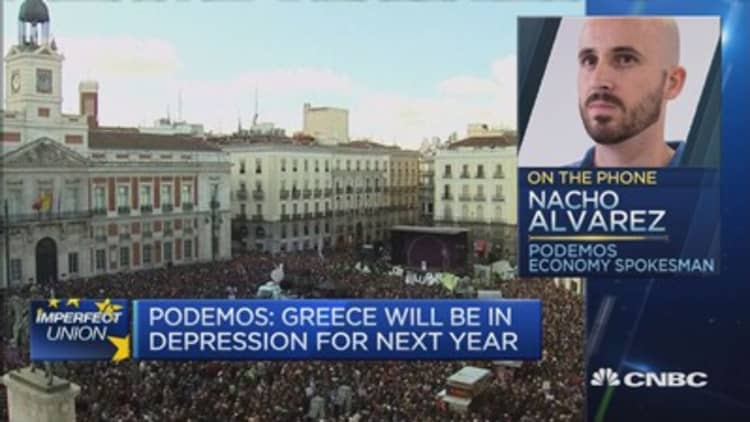
Spain's left-wing party Podemos has criticized the Greek bailout deal struck by the country's Syriza government, calling it "unsustainable."
Podemos Economy Spokesperson Nacho Alvarez told CNBC on Wednesday that the reforms-for-aid deal will maintain the exact austerity policies that got Greece into trouble in the first place.
"This agreement was not designed to solve the economic problems (of Greece)," Alvarez told "Worldwide Exchange." "It's not a good agreement."
The comments come as Greek lawmakers vote on a set of swingeing austerity and reform measures, insisted upon by creditors for Greece to get a much-needed third bailout.
Prime Minister Alexis Tsipras could face a revolt from inside his own party, however, amid discontent over the austerity measures both at home -- and now abroad.
"It was basically designed with political objectives," Alvarez added, saying that creditors were taking advantage of the "enormous financial pressure" that Greece is under and were trying to "break" the country's government.
Both Podemos and Syriza are members of the left-wing European parliamentary coalition GUE/NGL and are often identified as anti-austerity allies.
Large anti-austerity marches in Madrid earlier this year in support of Podemos led some to question whether Spain could become the "next Greece." The country's political parties are readying themselves for a general election in December 2015 that could see the fledgling anti-austerity party take a significant step towards power.
A poll published earlier this month in Spain's national newspaper El Pais put Podemos in third place, running close behind the ruling People's Party and socialist-democrats PSOE with 21.5 percent of the vote.
Read MoreWhya pony-tailed academic could rock Spain
But Alvarez was quick to draw distinctions between Greece and Spain, saying their economies are "very different."
"For example, the main problem with debt for the Spanish economy is not public debt, but private debt," he said, adding that one of Podemos' first moves if it came to power would be to restructure private mortgage debt.
"But for the case of Greece, there is no way that Greece can... come out of the depression without an important debt restructuring."
As part of the deal between Greece and its creditors, primary-surplus targets have been set, which Alvarez argued would be "basically impossible to achieve."
"(It) entails enormous social costs but also economic costs and at the end of the day is unsustainable," he added.

